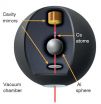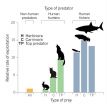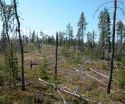(Press-News.org) PHOENIX, Ariz. -- Aug. 20, 2015 -- A study by the Translational Genomics Research Institute (TGen) and other major research institutes, found a new set of genes that can indicate improved survival after surgery for patients with pancreatic cancer. The study also showed that detection of circulating tumor DNA in the blood could provide an early indication of tumor recurrence.
In conjunction with the Stand Up To Cancer (SU2C) Pancreatic Cancer Dream Team, the study was published in the prestigious scientific journal Nature Communications.
Using whole-exome sequencing -- looking at the DNA protein-coding regions of 24 tumors -- and targeted genomic analyses of 77 other tumors, the study identified mutations in chromatin-regulating genes MLL, MLL2, MLL3 and ARID1A in 20 percent of patients associated with improved survival.
In addition, using a liquid biopsy analysis, the study found that 43 percent of pancreatic cancer patients had circulating tumor DNA (ctDNA) in their bloodstream at the time of diagnosis.
Very importantly, the study also found that detection of ctDNA following surgery predicts clinical relapse of the cancer and poor outcomes for patients. In addition, using a liquid biopsy detected the recurrence of cancer 6.5 months earlier than using CT imaging.
"These observations provide predictors of outcomes in patients with pancreatic cancer and have implications for detection of tumor recurrence, and perhaps someday for early detection of the cancer," said Dr. Daniel D. Von Hoff, TGen Distinguished Professor and Physician-In-Chief, Co-Director of TGen's SU2C Pancreatic Cancer Dream Team, and Chief Scientific Officer at the Virginia G. Piper Cancer Center Clinical Trials at HonorHealth (formerly Scottsdale Healthcare). Dr. Von Hoff was one of the authors of the study.
The pancreatic cancers analyzed in the study were stage II tumors from patients who underwent potentially curative surgery. Only 15-20 percent of patients are candidates for tumor resection, because pancreatic cancer is difficult to detect and usually is not diagnosed until its late stages when surgery is no longer an option. The 5-year survival rate for those diagnosed with pancreatic cancer is less than 10 percent.
The study's results found that a significant number of early-stage pancreatic cancers could be diagnosed non-invasively using liquid biopsy blood analysis that focuses on a few specific genetic alterations.
"We have identified MML genes as markers of improved prognosis for patients with pancreatic cancer," Dr. Von Hoff said. "We have also shown that ctDNA in the blood of pancreatic cancer patients may provide a marker of earlier detection of recurrence of the disease."
The study -- Clinical implications of genomic alterations in the tumor and circulation of pancreatic cancer patients -- was published July 7.
This analysis suggests that additional studies should "evaluate more intensive therapies" for patients without MLL mutations or with detectable ctDNA following surgical removal of their tumors, as well as interventional clinical trials, the study said.
INFORMATION:
Other participants in this study included: Johns Hopkins University School of Medicine, Mayo Clinic, and Memorial Sloan Kettering Cancer Center.
About TGen
Translational Genomics Research Institute (TGen) is a Phoenix, Arizona-based non-profit organization dedicated to conducting groundbreaking research with life changing results. TGen is focused on helping patients with cancer, neurological disorders and diabetes, through cutting edge translational research (the process of rapidly moving research towards patient benefit). TGen physicians and scientists work to unravel the genetic components of both common and rare complex diseases in adults and children. Working with collaborators in the scientific and medical communities literally worldwide, TGen makes a substantial contribution to help our patients through efficiency and effectiveness of the translational process. For more information, visit: http://www.tgen.org.
Press Contact:
Steve Yozwiak
TGen Senior Science Writer
602-343-8704
syozwiak@tgen.org
If dark energy is hiding in our midst in the form of hypothetical particles called "chameleons," Holger Müller and his team at the University of California, Berkeley, plan to flush them out.
The results of an experiment reported in this week's issue of Science narrows the search for chameleons a thousand times compared to previous tests, and Müller, an assistant professor of physics, hopes that his next experiment will either expose chameleons or similar ultralight particles as the real dark energy, or prove they were a will-o'-the-wisp after all.
Dark energy ...
Management of boreal forests needs greater attention from international policy, argued forestry experts from the International Institute for Applied Systems Analysis (IIASA), Natural Resources Canada, and the University of Helsinki in Finland in a new article published this week in the journal Science. The article, which reviews recent research in the field, is part of a special issue on forests released in advance of the World Forestry Congress in September.
"Boreal forests have the potential to hit a tipping point this century," says IIASA Ecosystems Services and Management ...
This news release is available in Japanese.
Humans are just one of many predators in this world, but a new study highlights how their intense tendency to target and kill adult prey, as well as other carnivores, sets them distinctly apart from other predators. As humans kill other species in their reproductive prime, there can be profound implications -- including widespread extinction and restructuring of food webs and ecosystems--in both terrestrial and marine systems. To evaluate the nature of human predation compared to nonhuman predation, Chris Darimont et al. conducted ...
This news release is available in Japanese.
In this special issue, the editors of Science invite experts to provide closer looks at how natural and human-induced environmental changes are affecting forests around the world, from the luscious, diverse forests of the tropics, to the pristine, resilient boreal forests of the north. The special issue is complemented by a package from Science's news department.
Amid extreme environmental and climate changes, Susan Trumbore and colleagues highlight the urgency of monitoring forest health, especially ...
This news release is available in Japanese.
Amid continued difficulties around assessing bioweapons threats, especially given limited empirical data, Crystal Boddie and colleagues took another route to gauge their danger: the collective judgment of multiple experts. The experts' opinions on bioweapons-related risks were quite diverse, the Policy Forum authors say, adding to the challenge around developing a regulatory system for legitimate dual use research. Boddie et al. explain how they employed a Delphi Method study to query the beliefs and opinions of 59 experts ...
An examination of the immune genes of the southern African Khoe-San people has revealed a completely new kind of mutation, according to researchers at the Stanford University School of Medicine. The gene variant likely contributes to healthier babies, although the variant can also lower resistance to disease.
The findings grew out of a long-term effort by Peter Parham, PhD, professor of structural biology and of microbiology and immunology, to understand how immune system genes make us reject organ transplants.
A paper detailing the findings will be published online ...
CORVALLIS, Ore. - Myriad regulations and certification requirements around the world are making it virtually impossible to use genetically engineered trees to combat catastrophic forest threats, according to a new policy analysis published this week in the journal Science.
In the United States, the time is ripe to consider regulatory changes, the authors say, because the federal government recently initiated an update of the overarching Coordinated Framework for the Regulation of Biotechnology, which governs use of genetic engineering.
North American forests are suffering ...
Are humans unsustainable 'super predators'?
Want to see what science now calls the world's "super predator"? Look in the mirror.
Research published today in the journal Science by a team led by Dr. Chris Darimont, the Hakai-Raincoast professor of geography at the University of Victoria, reveals new insight behind widespread wildlife extinctions, shrinking fish sizes and disruptions to global food chains.
"These are extreme outcomes that non-human predators seldom impose," Darimont's team writes in the article titled "The Unique Ecology of Human Predators."
"Our ...
Scientists have exposed a chink in the armour of disease-causing bugs, with a new discovery about a protein that controls bacterial defences.
Bacteria react to stressful situations - such as running out of nutrients, coming under attack from antibiotics or encountering a host body's immune system - with a range of defence mechanisms. These include constructing a resistant outer coat, growing defensive structures on their surface or producing enzymes that break down the DNA of an attacker.
The new research shows that a protein called sigma54 holds a bacterium's defences ...
WEST LAFAYETTE, Ind. -- Results of the XENON100 experiment are a bright spot in the search for dark matter.
The team of international scientists involved in the project demonstrated the sensitivity of their detector and recorded results that challenge several dark matter models and a longstanding claim of dark matter detection. Papers detailing the results will be published in upcoming issues of the journals Science and Physical Review Letters.
Dark matter is an abundant but unseen matter in the universe considered responsible for the gravitational force that keeps the ...



